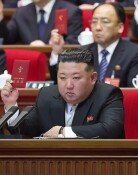NEC chairperson role should be changed into full-time position
NEC chairperson role should be changed into full-time position
Posted June. 21, 2023 07:58,
Updated June. 21, 2023 07:58
The National Election Commission is a constitutional institution, meaning that the basis for its establishment is expressly stated in the Constitution. The National Assembly, the court, and the presidential office are all constitutional organs. There should be a constitutional amendment to remove a constitutional organ. On the other hand, government ministries, such as the Ministry of Justice and the Ministry of Foreign Affairs, are based on the Government Organization Act, not the Constitution, and thus ministerial reform is possible whenever the need arises.
Most of the chiefs of constitutional institutions report to the office. The Speaker of the National Assembly to the National Assembly, the Chief Justice of the Supreme Court to the Supreme Court, and the President to the Presidential Office. They assume full-time responsibility. The Standard Korean Language Dictionary defines “full-time” as “going to the office every day by a certain time and working for agreed hours.
However, the chairperson of the National Election Commission does not go to work to the National Election Commission building. This is because Korea’s National Election Commission has been headed by one of the incumbent Supreme Court Justices on a part-time basis. The chairperson of the National Election Commission is the only part-time position among the heads of constitutional institutions. The heads of the district courts of the competent jurisdiction on a part-time basis also head each local election commission.
Given that a Supreme Court justice must wear two hats at the same time, it was no surprise when election mishap occurred back in March 2022. The chairperson of the National Election Commission at the time was Supreme Court Justice Noh Jeong-hee. She was not on-site at the National Election Commission building, which is located in Gwacheon, Gyeonggi Province. Despite the electoral malpractice during the presidential election process, the head of the Election Commission was absent from the site.
“Every day was essentially a 'no boss day,'” one official from the ruling party said half-mockingly. A former high-ranking official of the Election Commission also said that the chairperson is practically ignorant of how the organization runs and the work of the Commission. “All the chairperson does is sign documents,” the official said. It was thus a natural course of events that the commission was mired in malfeasance. An official from the Commission provided insider information about an upcoming recruitment process before an official notice of recruitment was issued, and his child subsequently participated in an interview where the interviewers were his father’s colleagues, mentioning that his father holds a position in public service related to elections.
Despite misconduct scandals as seen above, the Commission refused to undergo an audit and inspection of the Board of Audit and Inspection under the pretext of impartiality and independence of the Commission. However, the Commission failed to uphold the impartiality it strongly espoused, evidenced by the very fact that a person who previously worked for a presidential election campaign became a standing member of the commission and the recent decision by the Commission that a banner carrying a slogan that it thinks inappropriate.
In response to the worsening public sentiment, the Commission ultimately consented to an audit and inspection in light of the misconduct scandal surrounding the father’s inappropriate recruitment tip provided to his child. The Commission will also appear for the National Assembly’s investigation, the first in its 60-year history. Despite being the most significant threat the commission faces since its inception, this situation presents an opportunity for the Commission to undergo transformation and comprehensive reform.
The political sphere should go beyond mere criticism and actively pursue institutional measures to establish the Commission as an impartial and independent organization. Converting the chairperson role into a full-time position and implementing reforms in the process of electing the chairperson are vital steps in this endeavor.
Elections serve as the cornerstone of democracy. Korean citizens place their trust in the power of their votes, which are cast through universal, equal, and direct elections, and they accept the outcomes. In order to prevent the erosion of public trust in both the Commission and the electoral process, the Commission must preemptively take transformative measures.







